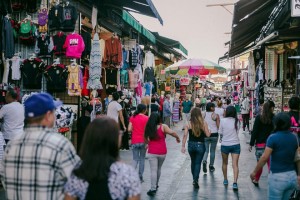
Now, this whipsaw legal maelstrom is almost enough to make me pity the BID. They get sued on the one hand by the Horlings because they don’t use their security enforcement resources aggressively enough to keep their district sufficiently safe and on the other hand they get sued by the National Lawyers Guild LA because they do use their security enforcement resources too aggressively to keep their district overly safe in some sense. Although my personal sympathies lie with the NLG and the street vendors and against the BID in both cases, that’s not so important as the lesson that these two lawsuits, coming at the BID from opposite directions, have to teach about the internal contradictions of the very existence of BID security in a free society.
If you read through the Horlings documents you’ll see a bunch of paperwork from LAPD Internal Affairs. Without commenting on the merits of the case, which I know nothing about, I will say that this is both impressive and as it should be. The LAPD has a great deal of power over the citizens of LA, and there is what seems to be an extensive oversight process to control it. It may not work effectively, it may be unfair and even corrupt, I just don’t know, but the fact that it exists is immensely important (and exists due to decades of hard work by thousands of activists, lawyers, and others).
Unlike the LAPD, BID security forces operate with no oversight at all. The state agency that regulates security agencies won’t accept complaints about their abuses, being mostly concerned with technical licensing issues and so forth. The City of Los Angeles maintains an attitude of plausible deniability towards BID security actions, in fact all BID actions, even while cooperating closely with them on all levels. The City generally refuses even to enforce the terms of its contracts with the BIDs,1 and even if it did, those contracts don’t regulate BID security in any way. While I don’t think at all that I’ve obtained a complete record of the Horlings case, I can be sure that, when I do, if I do, there still won’t be any documentation about administrative (as opposed to judicial) complaints regarding the BID’s security. There simply is no mechanism for filing such complaints, leaving the victims of both the ineffectiveness and of the overeffectiveness of the BID security no option but to sue.
Even more importantly, there’s no effective mechanism for citizens to influence the policies under which BID security operates. For the LAPD we have the Police Commission and the Office of the Inspector General. Again, these bodies may or may not be effective, but they exist. Now, it’s true that BIDs fall under the Brown Act and it’s possible for members of the public to speak at their board meetings, but the huge difference is that the Police Commission and the OIG are independent of the LAPD, and BID Boards are absolutely not independent of BID security.
However, the City of LA uses BID security to do stuff that it’s not allowed to do, that it would get in immense amounts of trouble for doing, and part of that utility is that BID security ends up with more power than any such group should have without being subject to civilian oversight. Furthermore, BID security patrols are responsible for a surprisingly huge proportion of law enforcement in this city. By some metrics, among some populations, in some neighborhoods, they are significantly more responsible than the LAPD themselves.2
This isn’t just bad in theory, it’s almost certainly going to turn out to be bad in practice in the specific sense that ongoing investigations, lawsuits, theorizing, study of the BIDs, and so on, are going to bring out contradictions, illegalities, inconsistencies between various laws and regulations (e.g. the laws that allow BID security to exploit citizen’s arrests to operate like unlicensed police forces), and so on, which will, I predict, ultimately lead to more efforts like the NLG’s lawsuits and Carol Liu’s idea-whose-time-has-come Right to Rest Act. This is how social change happens in the real world. Contradictions don’t just resolve themselves instantaneously, but get resolved through the kind of evolutionary process that we’re witnessing now, both from the side of the Horlings and from the side of the homeless, the dispossessed. Interesting times, interesting times.
- There’s a huge backstory here. It’s all far too inchoate for me to write about yet. Stay tuned, though, it’s going to be a biggie when it’s ripe.
- This is a huge claim, and I do have evidence for it, which is being analyzed and prepared for publication. It’s all public record though, so if you can’t wait, you can probably figure it out yourself.
Image of Santee Alley is a public record created by the Fashion District BID and is therefore not subject to copyright in California. It’s available here.
